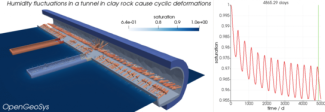
THM behaviour of clay rock and bentonite
The long-term international research project DEvelopment of COupled models and their VALidation against EXperiments (DECOVALEX) aims at the further development of coupled thermo-hydro-mechanical-chemical models to support the development of geological disposal options for radioactive waste, geothermal energy or other geotechnologies. The focus is on gaining knowledge of the relevant physical and chemical processes, their relative influence and their interdependencies. The core of the initiative is the comparison of the results of various numerical process models with elaborate experiments from a broad spectrum ranging from laboratory to large-scale field tests for the purpose of model development and validation (for further information please visit decovalex.org).
Here at the Technische Universität Bergakademie Freiberg we are participating in this project by further developing and using the open-source software OpenGeoSys, for example to model the Full-Scale Emplacement Heater experiment performed in the Swiss underground research laboratory in Mt. Terri. The aim of the experiment and its modelling is in particular to understand which multiphysical approaches can be used to predict the pore pressure development and stress redistribution due to heat generation in a potential repository. To this end, we are developing models that can describe the thermal, hydraulic and mechanical behaviour of claystone and bentonite under unsaturated conditions. Not only the description of the individual processes by means of balance relations and constitutive relationships, but especially their coupling poses a challenge, since, among other aspects, different spatial and temporal scales must be taken into account.
The project is funded by the federal company for radioactive waste disposal (Bundesgesellschaft für Endlagerung BGE).